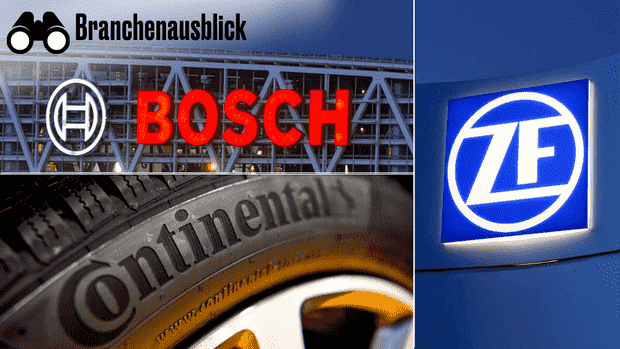Düsseldorf, Stuttgart At the start of the world’s largest electronics trade fair, CES, ZF board member Martin Fischer summed up where the trend in the automotive supplier industry is headed in one sentence: “Software is everything, everything is electronic.” The change from a supplier of mechanical components to a software and electronics supplier is now clear. The industry leaders around Bosch and Continental are no longer vying for orders for turbochargers or transmissions, but for central computers and car operating systems.
The major corporations in the German auto supplier industry began their transformation years ago. And in all likelihood they will be strong enough to weather the paradigm shift. In the past year, you obtained billions in orders for central on-board computers, driver assistance systems and electric drive trains.
Both Bosch and ZF had therefore declared 2021 to be the year of the decision. ZF manager Fischer now adds: “We are bullish. 2022 will again be a decisive year. ”Also because e-mobility is arriving faster than experts expected two years ago.
The major auto suppliers are now hoarding as many orders as possible in the transition to at least partially compensate for missing orders for the much more labor-intensive combustion technology and the threat of staff cuts. Bosch, ZF and the Vitesco drive unit, which has just been spun off from Continental, already have electrical orders worth tens of billions of euros – and the trend is growing rapidly.
Top jobs of the day
Find the best jobs now and
be notified by email.
At the same time, the corporations are hungry for lucrative jobs in the software and driver assistance area. At the beginning of the year, ZF landed a new major customer, Vinfast from Vietnam, one of the fastest growing vehicle manufacturers in the world. ZF will supply the electric car manufacturer with camera, radar and lidar sensors that are networked in a central control unit.
Series: Industry Outlook 2022
The increased use of software and electronics in cars is also changing competition: the car industry is becoming more and more attractive for tech companies. Last year, for example, the US chip manufacturer Qualcomm took over the Swedish supplier Veoneer, which specializes in driver assistance systems. The group outbid the traditional supplier Magna by around one billion dollars.
Nicolas Zintl from the investment bank Houlihan Lokey, which specializes in the automotive supply industry, expects a lasting change in the market. “The entry of tech companies into the auto industry could drive up takeover prices from technologically mature suppliers,” he explains.
M&A market for combustion engine business does not get off the ground
For all medium-sized and small suppliers who are exclusively or predominantly dependent on the internal combustion engine, however, the problems are getting bigger and bigger this year. Because not everyone was able or willing to include components for e-cars in their range in the past. Companies like the exhaust manufacturer Eberspächer slept through electromobility at first and then missed the time to sell the combustion engine business in good time.
In the drive market, investment bankers expected higher buying and selling activities a year ago. It was said that investors and pure combustion engine suppliers were taking over corresponding components from competitors. But this M&A market is not getting off the ground.
“Among other things, this has to do with the fact that electrification is once again experiencing a significant acceleration. As a result, the demand for pure internal combustion engines is falling even more than expected, while the electrical business reaches profitability threshold more quickly, ”confirms Vitesco boss Andreas Wolf. “From this industrial logic alone, it would be understandable that investors do not invest in such a falling market.”
Investment banker Zintl perceives a similar development. “We are currently observing that combustion engine divisions that are currently still highly profitable but no longer have a future as a result of technological change are difficult to sell,” says the banker.
Instead, Zintl’s colleague Niklas Lerche sees the trend for larger suppliers such as Vitesco to consolidate the relevant business areas on their own. “That means they work off their orders and let the business run out without selling it first.”
Chip shortage will also affect 2022
It has therefore also become quiet about the ambitious Best Owner Group (BOG). The idea of joining forces with investors and unions from companies with combustion engine business that is not in need of restructuring but is expiring to form a shrinking but profitable business model does not seem to work. Investment banker Zintl is not surprised: “If private equity should invest in the automotive sector, it will certainly not invest in the internal combustion engine.”
Vitesco boss Wolf has not yet met such a “consolidator” either. “This last-man-standing, who waves his wallet and says that he is buying up our turbocharger business, for example, has not yet appeared,” he says.
Regardless of the size, all suppliers will again suffer from the chip shortage in 2022. The new Bosch boss Stefan Hartung expects the component crisis and further delivery bottlenecks to continue at least until the end of the year. As a result of the shortage of chips, Hella, for example, has already had to revise its sales forecast downwards twice.
While the carmakers are increasing their profits despite falling quantities, because they are installing the available chips in the higher-margin upper-class models, the suppliers are groaning more and more. “The losers of the last few months have certainly tended to include the automotive suppliers, who suffer massively from the lack of parts, but also have to cope with enormous pressure from the car manufacturers,” explains NordLB analyst Frank Schwope.
More: The shortage of semiconductors will persist in the industry in the coming year
